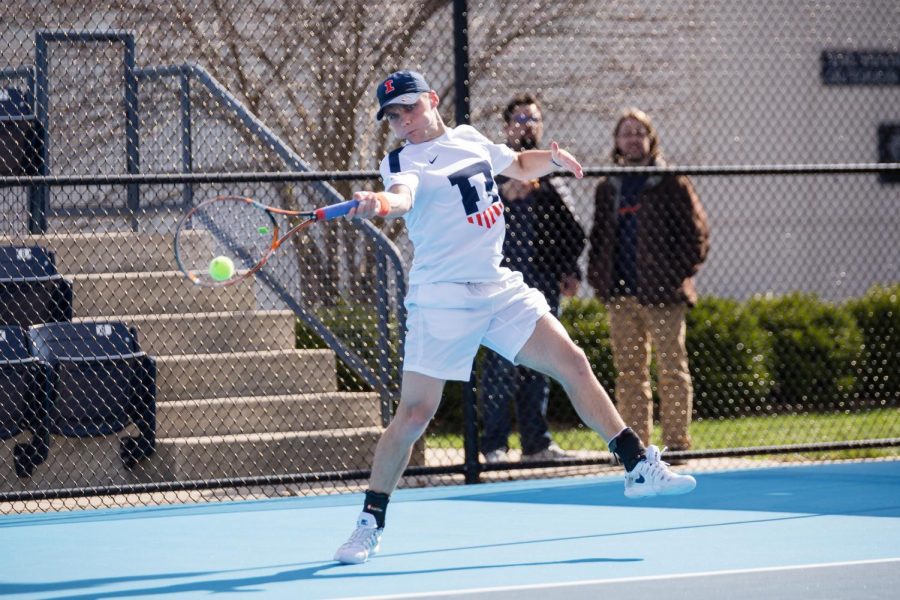Doubles matches pose different challenges
Junior Zeke Clark serves the ball during a match. The men’s tennis team boasts several powerful duos in fast-paced doubles matches, leaving plenty to look out for this season.
Nov 6, 2018
While singles matches often receive more attention, the doubles portion of competitions still have value, especially in the college game. Winning a match in doubles can make a difference when it comes to crowning a conference and even a national champion.
Some consider doubles to be a completely different sport from singles. Positioning is different, the court is different, and most importantly, there are two players. One of the biggest factors in a doubles match is how you start.
“If you get down, it’s really tough to dig your way back,” junior Zeke Clark said. “In singles, rallies are a little bit longer, and you can kind of dig your teeth in and grind it out. Whereas in doubles if you get down a break, you’re really fighting an uphill battle.”
The fast pace of doubles means great starts increase odds of victory because the matches are only one set.
Singles matches go back and forth with ground strokes playing a large role, but doubles matches are more dependent on the serve. The court is bigger, but with a second player, there is limited space to return shots. This makes a great serve that much more valuable and the ability to return the serve crucial.
Get The Daily Illini in your inbox!
“In general, serving is the biggest thing,” sophomore Caleb Chakravarthi said. “If you hit your spots well and you’re serving well, you’re going to get finished balls.”
Doubles also differ when it comes to the team aspect of the sport. Teammates have to rely on one another, and communication becomes key. It may be small, but calling the ball out is critical when a pair is competing. A successful pair is able to do that without worrying about their partner.
“When I play doubles, I try to do my part the best I can,” said junior Aleks Kovacevic. “You want to try to set up your partner well for certain points, but you just want to take care of your part, and if both players take care of their parts everything will go fine.”
The mental side of the game is also crucial to success in doubles. Tennis can be mentally draining, and keeping focus with what’s happening can be tough. Those that can break through this barrier oftentimes come out on top.
“Everyone can hit good forehands, backhands and volleys, but it’s usually the person that can stay the toughest that’s the best,” Clark said. “In doubles (the mental side) is extremely important because the ball is coming fast. You have a lot of quick reactions, so you really have to be sharp all the time. In singles you can work out a little bit of the nerves because you have more time than doubles.”
This year’s team features some intriguing doubles pairings: sophomores Alex Brown and Caleb Chakravarthi return as the best doubles pair from a season ago. They went 21-10 as a pair and won their Big Ten Conference games at a .600 clip. The duo is one year older, and many around the team are high on the pairing.
Another grouping to look out for is Aleks Kovacevic and Zeke Clark. The juniors had the second-most wins, behind Brown and Chakravarthi on the Illini last season. Junior Vuk Budic will compete in doubles again this season. He played with five different partners last year, so he will likely look for someone to build a partnership with. Freshman Keenan Mayo will be a name to follow, as he’s impressed coaches, and his six-foot-six frame looks to translate well to doubles play.
The Illini have many interesting players to watch, and doubles play could make the difference for them this season.






